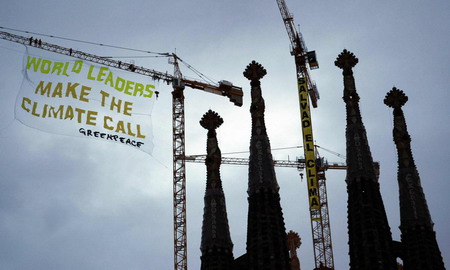Africans boycott meetings at UN climate talks
|
 Greenpeace activists hang banners at the Sagrada Familia Temple, designed by Antoni Gaudi, in Barcelona November 2, 2009. [Agencies] |
The closed-door meetings stalled by the African boycott focus on technical issues related to emissions reductions, including identifying new greenhouse gases to be regulated and setting rules by which rich countries might offset emissions with green technology investments in poor countries.
Aid groups worried about the disruption. "It would be tragic if ... we were prevented from building the foundation of rules and accounting systems that will ensure the effectiveness of emission targets," said Duncan Marsh, of The Nature Conservancy.
"We may not be able to agree all the words," Ban said, adding that the Copenhagen pact could more likely be an agreement on principles, rather than specific targets for cuts. "We need at this time the political will, if there is a political will, there is a way we can come to a binding agreement in Copenhagen."
The Copenhagen deal would succeed the 1997 Kyoto Protocol, which called on 37 industrial countries to reduce heat-raising gas emissions by an average 5 percent below 1990 levels by 2012. The United States was the only major greenhouse gas emitter to reject the Kyoto accord.
On Monday, the US came under renewed pressure to declare its intentions at the U.N. talks before the December 7-18 Copenhagen meeting.
The US says it is waiting for Congress to finish work on climate and energy legislation. Those bills, unlikely to be completed before the Copenhagen summit, suggest the US would cut emissions only about 4 percent below 1990 levels over the next decade.
This week Republican Party senators threatened to boycott some of the congressional meetings, demanding additional studies on the bill's cost and job impact.
Hugh Cole, climate adviser for charity group Oxfam in Southern Africa, said resolving the Africans' protest was up to the US and European Union.
"The world's poorest nations are faced with an impossible choice, no climate deal or a bad climate deal," Cole said in a statement. He called on EU and US leaders meeting Tuesday afternoon in Washington "to signal that they are willing to play their part."
German Chancellor Angela Merkel was also in Washington on Tuesday, urging both chambers of a skeptical Congress to "overcome the walls of the 21st Century" and emphasizing the need for a global agreement on climate change.

























